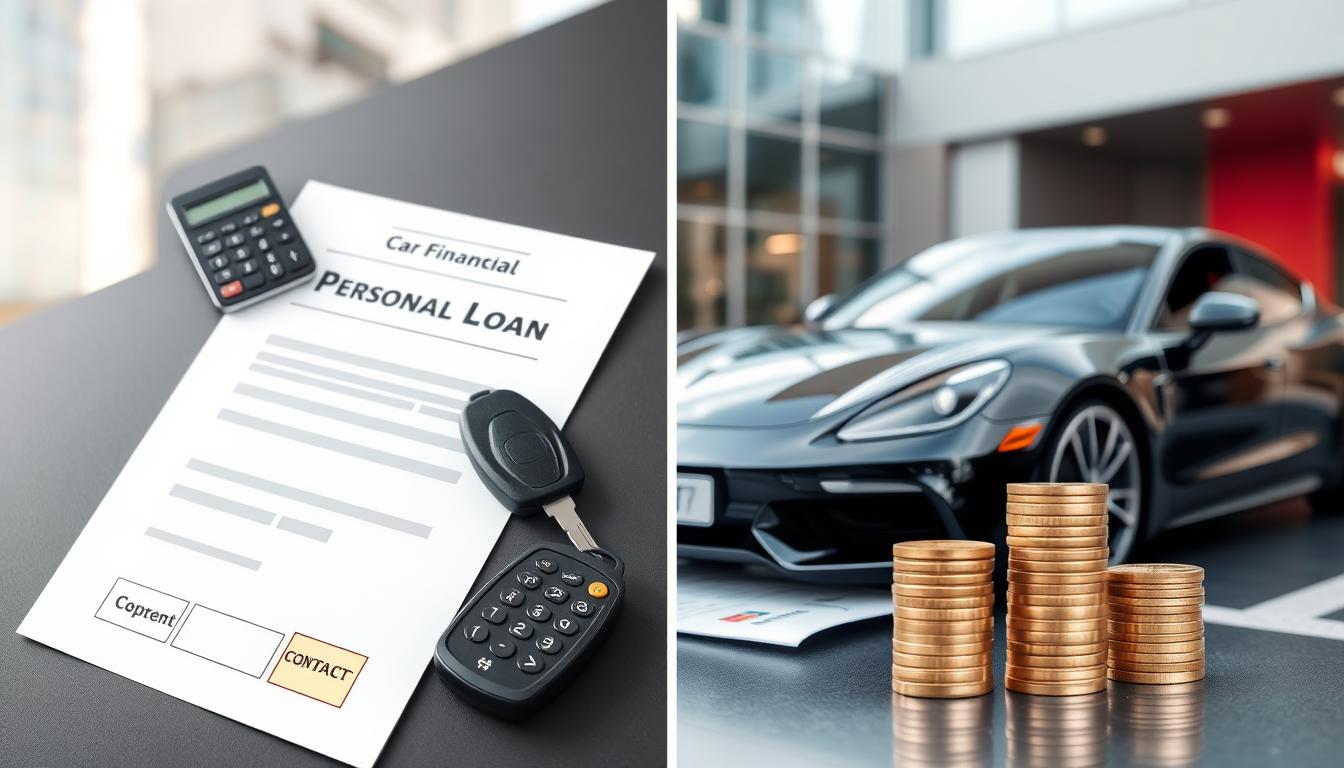In the UK, buying a car comes with many financing choices. You can pick between a personal loan or car finance. Each option affects your money and future financial plans. Let’s look at the good and bad sides of each to guide you.
Personal loans let you buy a car with cash upfront, giving you full control1. These loans last from one to seven years, with shorter ones saving you on interest1. On the other hand, car finance lets you pay in bits, possibly owning the car later1. But, leasing doesn’t give you ownership, and car finance deals might limit your car’s use.
The main differences are in who owns the car, interest rates, and credit checks2. Personal loans are harder to get for those with bad credit, while car finance is easier to get through dealerships1. Also, car loans usually have lower interest rates because the car acts as security2.
Understanding Car Finance and Personal Loans Basics
When buying a car, you have many financing choices. Car finance includes hire purchase, personal contract purchase (PCP), and car leasing3. On the other hand, a personal loan lets you get a set amount of money from a bank or online lender. You then pay it back in fixed monthly instalments3.
What is Car Finance?
Car finance usually starts with a deposit and then regular monthly payments. With hire purchase, you might not own the car until you’ve made the final payment3. PCP plans let you make payments based on the car’s expected resale value. You can choose to buy the car at the end of the contract3. Leasing, or personal contract hire, means you can rent a car without owning it. Your monthly payments cover the car’s depreciation and might include service and maintenance3.
How Personal Loans Work for Car Purchases
A personal loan gives you a fixed amount of money for a car3. You repay it in regular instalments over a set time, usually 1-7 years4. This option makes your monthly payments predictable because the interest rate and term are fixed3.
Key Differences Between Financing Options
Car finance and personal loans differ in key areas. Car finance agreements might have mileage limits and variable interest rates. Personal loans usually have fixed rates and let you own the car right away3. Also, hire purchase and PCP plans often need a deposit. But personal loans are unsecured and don’t require a down payment4.
Choosing between car finance and a personal loan depends on your financial situation, credit score, and goals. Getting advice from a financial advisor can help find the best option for you.5
| Financing Option | Typical Repayment Period | Deposit Requirement | Ownership |
|---|---|---|---|
| Personal Loan | 1-7 years4 | No deposit required | Immediate ownership |
| Personal Contract Purchase (PCP) | 1-4 years4 | Deposit typically required | Option to purchase at the end of the contract |
| Hire Purchase (HP) | 1-5 years4 | Deposit typically required | Ownership transferred at the end of the contract |
| Personal Contract Hire (PCH) | 1-5 years4 | Deposit typically required | No ownership – vehicle is rented |
“Having a low credit score can make it challenging to be approved for car finance, urging individuals to monitor their credit score and payment history to improve their chances.”3
Personal Loan or Finance Car: Which Option Costs Less?
Choosing between a personal loan and a car finance deal can greatly affect your costs. Your credit score, loan terms, and available deals are key factors. Those with excellent credit might find personal loans cheaper, thanks to lower interest rates6.
Car finance deals, like 0% interest offers, can be very competitive. But, they often need a good credit score and a big deposit7. Car finance might also have extra fees, like origination or early termination fees, which can increase costs6.
| Financing Option | Average APR | Potential Savings |
|---|---|---|
| Personal Loan | 3.5% | £292 monthly repayment |
| Car Finance (PCP) | 0% to 10% | Up to £10,000 in deposit contributions |
When looking at borrowing costs, consider the APR, loan term, and any extra fees67. Personal loans might offer more freedom, like selling the car anytime. Car finance deals might have mileage limits and other restrictions6.
The best choice between a personal loan and car finance depends on your situation and credit score67. Think about interest rates, fees, and penalties to make a smart choice. This way, you can find the right financing for you.
“Assessing the total costs, including interest, fees, and penalties, over the entire loan or finance agreement term can help identify the more cost-effective option between car loans and car finance.”
Advantages and Disadvantages of Car Finance
When buying a car, you can choose between a personal loan or car finance. Both have good points, but it’s key to know the car finance specifics8.
Benefits of Choosing Car Finance
Car finance often means lower monthly payments than personal loans. This is great for those on a tight budget or who want easier payments. It’s also easier to get car finance if you have bad credit, as the focus is on the car’s value, not your credit history9.
Car finance also offers flexibility. Options like Personal Contract Purchase (PCP) and leasing let you return or upgrade your car at the end. This flexibility meets changing needs8.
Drawbacks to Consider with Car Finance
Car finance has its downsides too. One big issue is the higher interest costs. This can make the total cost of the car higher than a personal loan8.
Another problem is the limits on car choice and use. Lenders set mileage limits, and there are penalties for going over or ending the agreement early. This can limit your freedom to use the car as you wish9.
Lastly, car finance means you don’t own the car until you’ve made the final payment. This might not appeal to those who want full ownership and control8.
Understanding Mileage Restrictions and Ownership
Mileage limits are common in car finance, especially in PCP and leasing. These limits are usually between 10,000 to 30,000 miles a year. Going over can lead to big fines9.
Also, with car finance, you don’t own the car until the agreement ends or after a big final payment. This means the lender owns it until then. This can affect your sense of control and investment in the car8.

Benefits and Drawbacks of Personal Loans for Cars
Personal loans are a good choice for buying a car, alongside traditional car finance. Personal loans have their pros and cons to think about10.
One big plus of personal loans is you get to own the car right away. You don’t have to wait for a final payment like with some car finance deals10. This means you can change or sell the car whenever you want, without any mileage limits10.
Also, personal loans might have lower interest rates than car finance, especially if you have good credit11. As of November 2024, the average personal loan rate is 12.31%, while credit cards average 20.35%11. If you have excellent credit, you could get rates between 10.73% and 12.50%11.
But, personal loans usually mean higher monthly payments than car finance options like HP or PCP10. They also have stricter rules to qualify, and you can’t return the car at the end of the loan like with some car finance deals10.
One good thing about personal loans is the fixed interest rate and regular payments. This makes planning your budget easier10. Plus, many lenders let you pay off the loan early without extra fees, which can save you money10.
Choosing between a personal loan and car finance depends on your situation, credit score, and financial goals. It’s key to look at things like unsecured car loans, fixed interest rates, car loan flexibility, and early repayment options to pick the best option for you1011.
“Carefully weigh the benefits and drawbacks of personal loans and car finance to make an informed decision that aligns with your financial situation and goals.”
Making the Right Choice Based on Your Circumstances
Choosing between a personal loan or car finance depends on your credit score, budget, and financial goals. Your credit score affects loan approval and interest rates for both options12. A better credit score means better terms, like lower interest rates13.
It’s key to understand your credit history and improve it if you can. This can help during the loan application process.
Looking at your monthly budget is crucial to find out how much you can afford to pay14. Financing a car can make it more affordable for many14. But remember to include extra costs like maintenance, fuel, and servicing in your budget14.
Think about your long-term goals versus short-term needs13. Getting a car loan might help you buy a newer, safer vehicle, fitting your long-term plans13. On the other hand, a personal loan offers more flexibility if you might need a new car soon14.
Consider your overall financial plan, including plans for buying a home or other big purchases. This will help you choose the best option for your situation.
FAQ
What is Car Finance?
Car finance means you don’t own the car right away. You can choose from hire purchase, personal contract purchase (PCP), or leasing.
How Do Personal Loans Work for Car Purchases?
Personal loans let you borrow money to buy a car. You then pay it back in instalments. This way, you own the car from the start.
What are the Key Differences Between Car Finance and Personal Loans?
Car finance and personal loans differ in who owns the car and how you pay back. Car finance might have mileage limits and changing interest rates. Personal loans give you immediate ownership and fixed rates.
Which Option is Cheaper: Personal Loan or Car Finance?
The cheaper option depends on your credit score and the loan terms. Personal loans might be cheaper if you have a good credit score. Car finance can offer 0% interest but needs a good credit score and a big deposit.
What are the Benefits of Choosing Car Finance?
Car finance lets you pay less each month. It’s easier to get approved, even with bad credit. You can also return or upgrade your car.
What are the Drawbacks of Car Finance?
Car finance can cost more in interest. You might face car choice and usage limits. There could be mileage charges. You won’t own the car until you’ve paid it off.
What are the Benefits of Personal Loans for Buying a Car?
Personal loans give you immediate car ownership. There are no mileage limits. You can sell or modify the car. Good credit can lead to lower interest rates.
What are the Drawbacks of Personal Loans for Buying a Car?
Personal loans mean higher monthly payments. They have stricter approval criteria. You can’t return the car at the end of the loan.
How Does Your Credit Score Affect Car Financing Options?
Your credit score greatly affects loan approval and rates. A higher score means better terms for both car finance and personal loans.
What Other Factors Should You Consider When Choosing Between Personal Loans and Car Finance?
Think about your monthly budget and if you want to keep the car long-term. Consider upgrading options and your overall financial plan when choosing between personal loans and car finance.

















